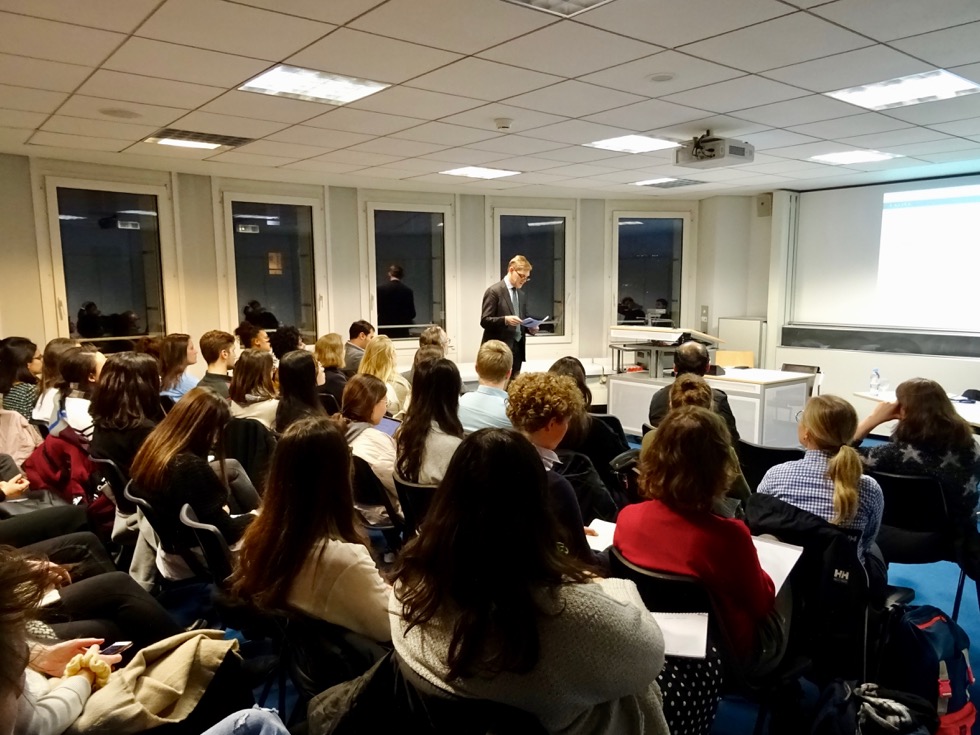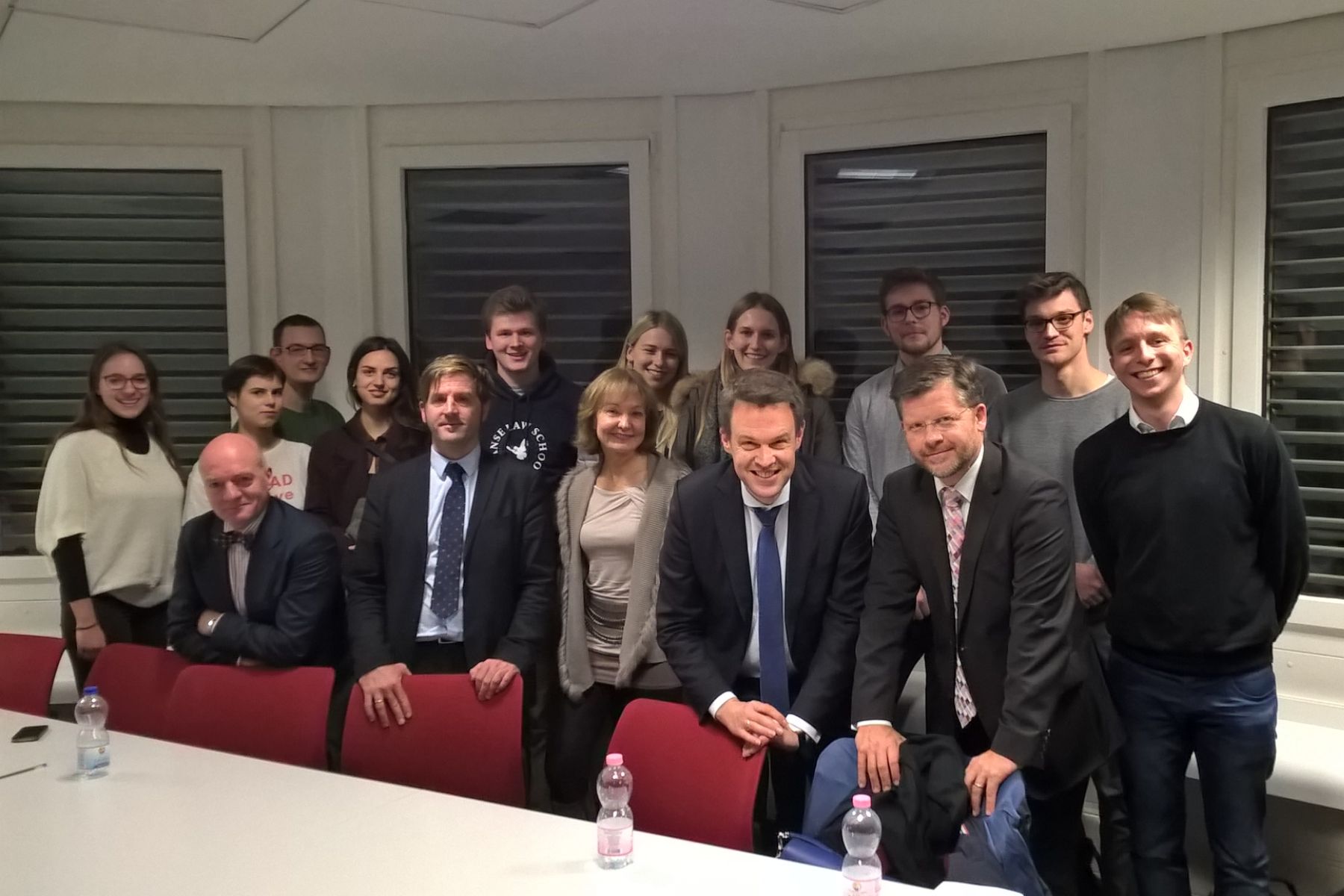News & Events
Career Information Event December 2021
The Geneva Society cordially invites you to its annual Career Information Event Speakers include Professor Clemens Ladenburger, Principal Legal Advisor, Director of Justice and Home Affairs, European Commission Maarten Wilbers, Deputy Legal Counsel, and Sofia Intoudi, CERN Attorney at law Dr. Max Baumgart, Assistant European Professor, China-EU School of Law, [...]
Successful event: “Life and career paths after the stay in Geneva” on 08.12.2017
As every year, the students of this year's class had the opportunity on December 8, 2017, to inform themselves about various career paths after their stay in Geneva. This year, the speakers were available to answer their questions: Jens Bormann, LL.M. (Harvard), Notary Public and President of the [...]
Conference and General Assembly 2018 in Geneva
Conference and General Assembly 2018 in Geneva Dear members and friends of the Geneva Society, this year's meeting of the Geneva Society took place in Geneva on June 1 and 2, 2018. THE BOARD Please, find further information in the following: [...]
About us
The Geneva Society aims at being much more than an alumni association that meets for social events. It resembles more an alumni club of American model. Of course, the Society is also intended to be a forum for alumni who want to maintain and cultivate contact with each other and with the University of Geneva. The most important goal is rather a different one: Geneva is known to be the seat of many international organizations such as the United Nations, the World Trade Organization, the World Labor Organization or the World Health Organization. In this unique cosmopolitan environment, students can expand their knowledge beyond national law at an early stage of their education, lay the foundations for comparative-critical legal thinking and, in the form of the certificate in transnational law, acquire a professional qualification that goes beyond the usual national training content. This concern, which is more topical than ever today, is supported by the Geneva Society with all its strength. We would therefore like to be present at the University of Geneva and maintain good contact with our Swiss colleagues. Of course, we are pleased to welcome all persons who wish to join the Society.
The Society
The Geneva Society is an association of former students, doctoral candidates and assistants of law at the University of Geneva, who are united by shared experiences and who wish to promote the study and research in Geneva in the field of transnational law, including international law, European Union law and comparative law. For historical reasons, the study of German law in Geneva also plays a special role. Today, the members of the Geneva Society are represented in many legal professions, both in academia and in practice. By organizing information events for students of the University of Geneva on professional and career paths for lawyers, we aim to highlight the opportunities and possibilities that may arise from a stay in Geneva. Through our alumni network, there are also opportunities for the exchange of experiences and the placement of internships. The scholarship of the Geneva Society supports law students from Germany during their studies abroad in Geneva. We recognize outstanding achievements of exchange students by awarding an annual prize for the best performance within the program of the Certificat de droit transnational or the Certificate in Transnational Law. We have also provided financial support to moot court teams at the University of Geneva. Our scientific conference, which usually takes place every two years in Geneva, aims to promote the exchange between current and former Geneva residents.
Statute
The Association has as it aims the promotion of academia and research, as well as of teaching and public and professional training, including student support in the area of transnational law (incl. international law, European Union law and comparative law), and to promote thinking internationally, tolerance between peoples from other cultures and a better understanding between peoples.
Board
The General Assembly is presided over by the Chairperson of the Board, or, in absentia, the deputy Chairperson.
Research Council
The Research Council has in particular the tasks of providing scientific support to the Geneva Society for the fulfilment of the Society’s purpose, supervising the Science Prize awarded by the Society and coordinating visiting professorships at the University of Geneva.
Foundation
„As former assistants of the Droit allemand of the University of Geneva, we want to create a society for all those who have studied, assisted, taught or still do so in Geneva. Meetings of “new” and “old” Geneva residents, lectures, conferences, exchange of ideas, publications, reunion with Geneva … are you interested?“
This timid question, which Dr. Eltje Aderhold (assistant to Prof. Dr. Hans Hanisch from 1988-1990) addressed to former “Genevans” in a circular letter towards the end of 1991, set the ball rolling. The response was huge. The idea of founding a “Geneva Society” as a scientific association and as a forum for alumni was so well received that the plans were quickly put into practice: On October 24, 1992 about fifty founding members gathered in the rooms of the Foreign Office in Bonn and founded the “Geneva Society – Association for Legal Studies”. Over Whitsun 1993 we had our first festive meeting in Geneva with well over one hundred alumni from almost all age groups, with a speech by the doyen of the faculté de droit, a keynote address by Prof. Dr. Walther J. Habscheid on the subject of “Arbitration in Germany and Switzerland” and another by Prof. Dr. Wernhard Möschel on the subject of “European Integration at a Turning Point”. This event was rounded off by a roaring ball in the age-worthy Hotel des Berques located directly on the lake.
Timeline – „Post tenebras lux“
400 years of studying German law in Geneva.
Activities
The activities of the Geneva Society include professional information and scientific events in Geneva, the scholarship, prizes, financial support of moot courts at the University of Geneva, regional networks and the internship exchange.
Studying in Geneva
“Imagine living in a city where there is a lake not far from where you live, but where you can also reach Mont Blanc in 15 minutes on foot, and where the distance between A and B is 20 minutes at the most, as well as by bicycle. At the same time, this city is so international that every second person comes from a different country. You can speak French or English and have a good chance of getting involved in the European headquarters of the United Nations. After one year of study, you will receive a degree in transnational law and will be trained both practically and theoretically in international and European law.”
Arne P. Wegner (scholarship holder of the Geneva Society 2016/17) on his studies in Geneva.
You can find detailed information about life and studies in Geneva under “Field reports”. The Geneva Society e.V. is committed in many ways to promoting the study of transnational law in Geneva. We recognize outstanding achievements of exchange students, for example, by awarding an annual prize for the best performance within the program of the Certificat de droit transnational or the Certificate in Transnational Law. Our academic conference, which takes place every two years in Geneva, aims to promote exchange between current and former Geneva students.
Scholarship
In order to support the stay in Geneva, the Geneva Society will grant EUR 150.00 per month in the academic year 2025/2026 to a law student with a German home university over a period of ten months. The scholarship will be granted for the duration of the stay in Geneva for all calendar months during the semesters, starting in September 2025. The scholarship is not earmarked for a specific purpose. The scholarship is accompanied by a free trial membership in the Geneva Society. Scholarship holders are required to provide regular proof of their academic achievements to an appointed member of the Executive Committee and to write a report. This report will be made available for information purposes on the homepage of the Geneva Society. Examinations are to be completed within the scope of eight semester hours per week during the semester.
Prizes
The Geneva Society awards three prizes annually to promote outstanding legal achievements at the University of Geneva. The three best candidates who have participated in the CDT/CTL program are awarded certificates in the annual remise des diplômes.
Regional Networks, Country Sections
Regional networks enable regular exchanges with other (former) Geneva students on site. Meetings of regional networks were held in Berlin and Cologne, for example. Are you interested in attending or organizing a regional network meeting? We are very happy to do so. Feel free to contact us at any time for further information.
Country sections serve to promote regional cohesion and networking among members. At the initiative of the members of a country, the board of directors can establish country sections at its own discretion.
Internship Assistance
In the past, the Geneva Society has repeatedly arranged internships (e.g. in law firms) by forwarding incoming inquiries from students to interested members. The Geneva Society would like to expand this service and asks you to send your requests to the Board.
Experience Reports
As a guide for future “Genevaers”, experience reports from current or former Geneva students will be published here. We kindly ask you to send us your contributions, gladly also with photos. We wish you profitable reading and would be pleased to receive as much feedback as possible.
In the following you will find the field reports of our two scholarship holders Arne P. Wegner (2016/17) and Lisa Evers (2015/16)
Moot Courts
The Geneva Society has repeatedly sponsored the Jessup Moot Court Team of the Université de Genève in the past.
Here you will find reports on the experiences of the sponsored teams:
Membership
Do you want to become a member of the Geneva Society? We are always open for new members. Simply use our contact formular below.
Network
Today, the members of the Geneva Society are represented in many legal professions, both academic and practical. Take advantage of the exchange opportunities offered by the network of the Geneva Society!
Become a member
Do you want to become a member of the Geneva Society? Then simply fill out our membership application online in English or German.
Support
Would you like to support the Geneva Society? Then please contact us via our contact form. We are grateful for any form of support!
Downloads
The minutes of the last general assemblies are available to download in the membership area. You will need a password for the download area. Please, find further downloads at “Experience Reports” and “Archive”
Contact
Here you can contact us quickly and easily.



